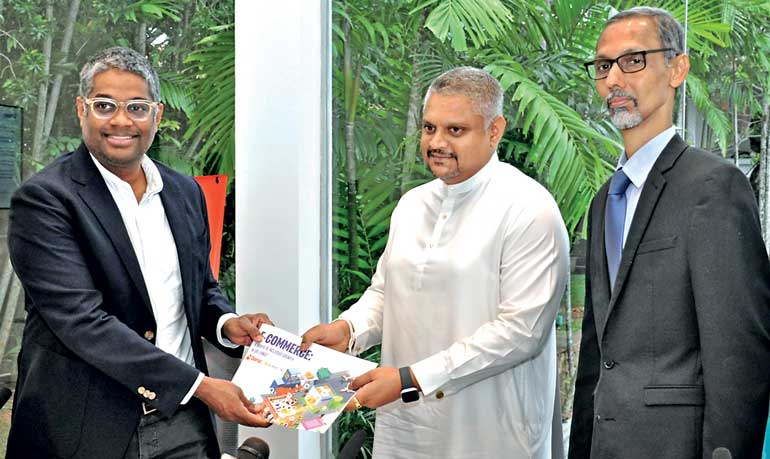Thursday Feb 26, 2026
Thursday Feb 26, 2026
Tuesday, 31 January 2023 03:03 - - {{hitsCtrl.values.hits}}

Daraz Managing Director Rakhil Fernando (left) presenting the report to State Minister of Technology Kanaka Herath yesterday. SLASSCOM Chairman Ashique M. Ali is also present – Pic by Lasantha Kumara
Daraz Sri Lanka and Sri Lanka Association for Software Services Companies (SLASSCOM) yesterday released the first in-depth study on the adoption and use of e-commerce in Sri Lanka during difficult economic times.
The report titled “E-commerce: A Driver of Inclusive Growth in Sri Lanka?” was presented to and discussed with State Minister of Technology Kanaka Herath, in the presence of key report contributors.
This report is the result of a partnership between Daraz Sri Lanka and the Sri Lanka Association for Software Services Companies (SLASSCOM) and aims to bridge crucial data gaps in the e-commerce industry, while also pointing to essential policy needs.
Dr. Ganeshan Wignaraja, a Professorial Fellow in Economics and Trade at Gateway House, Mumbai and a Senior Research Associate at ODI Global, London, designed and co-authored the report together with Daraz Sri Lanka Head of Public Policy and Corporate Affairs Anishka De Zylva. The survey was conducted by NielsenIQ Sri Lanka, under the supervision of NielsonIQ Sri Lanka Country Director Therica Miyanadeniya.
Commenting on the report, Dr. Ganeshan Wignaraja opined: “An expanding digital economy and the e-commerce sector are supportive of the economy’s shift from crisis to recovery in Sri Lanka’s 75th anniversary of independence. The first report on the sector aims to facilitate discussion of a market-friendly business environment by identifying micro-level dynamics of the e-commerce industry in Sri Lanka.”
The report is based on the meticulous collection of primary data through an islandwide survey of a sample population of more than 4,500 participants undertaken between March 2022 and July 2022.
The survey collected information in areas that are relevant to making business strategies and public policies covering the: (i) the use of e-commerce across provinces and districts; (ii) the types of goods and services purchased; (iii) purchasing behaviour during the pandemic; (iv) user behaviour by characteristics; (v) the types of devices and payment methods used for e-commerce purchases; (vi) factors discouraging online purchasing; (vii) the use of e-commerce for selling goods and services; and (vii) the influence of Government policy on e-commerce transactions from both a seller and consumer perspective.
Daraz Sri Lanka Managing Director Rakhil Fernando said: “E-commerce is still a relatively new industry in Sri Lanka. However, one of the main findings of this research is that e-commerce is already an islandwide phenomenon, and it is widely used for purchasing goods and services. Over 50% of the survey respondents in all provinces said they use e-commerce to purchase goods and services, and provinces close to and further away from the Western Province are not lagging in terms of e-commerce adoption.
“This is a strong indicator that e-commerce will play a catalytic role in advancing retail trade in Sri Lanka, despite the challenging landscape. The survey also provides many insights and ideas for the future growth of the industry, along with suggestions for a better business enabling environment which can lead to unlocking multiple opportunities if implemented within an apt policy framework.”
SLASSCOM Chairperson Ashique M. Ali said: “The accelerated growth of e-commerce has transformed the way businesses operate in the post-pandemic world. We have observed that in our region and beyond, countries that were quick to adopt e-commerce and digital payment methods have witnessed much higher, inclusive economic growth and this positive impact and trend can be beneficial for Sri Lanka, albeit the challenges of the economic crisis.
“This e-commerce research report provides a baseline for steering the expansion of the e-commerce sector amidst common challenges such as a lack of knowledge on e-commerce and low levels of trust in digital payment methods.
“We hope the guidance and ideas offered by this report will be appropriately employed by the relevant stakeholders including the Government and businesses, to create a more enabling business environment in which all businesses, including MSMES, women-led businesses, and even home-based artisans can thrive and grow in.”
The report will be made available as a downloadable PDF file on the Daraz and SLASSCOM corporate websites to anyone interested in understanding the industry at a deeper level. For more information email [email protected].